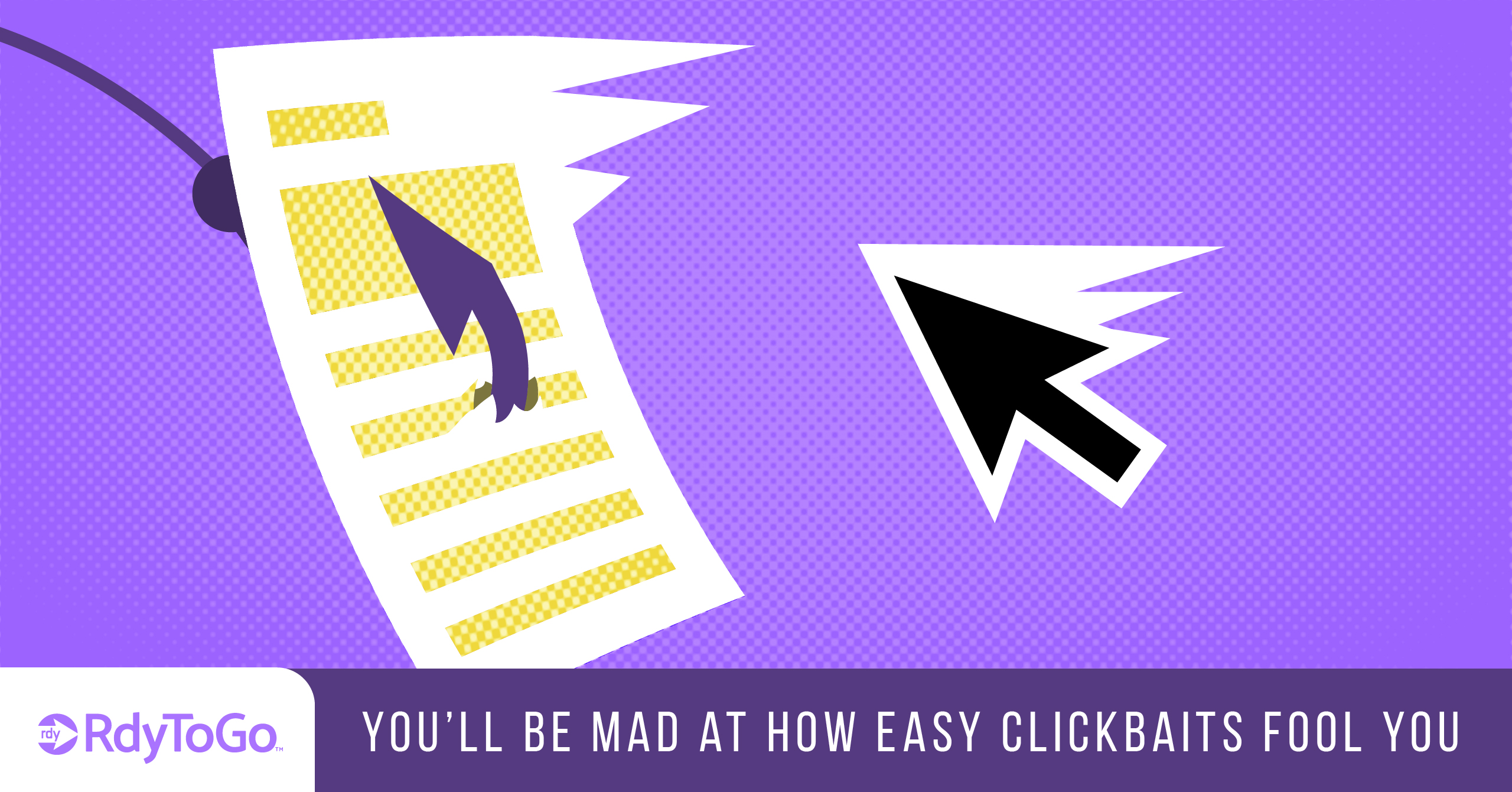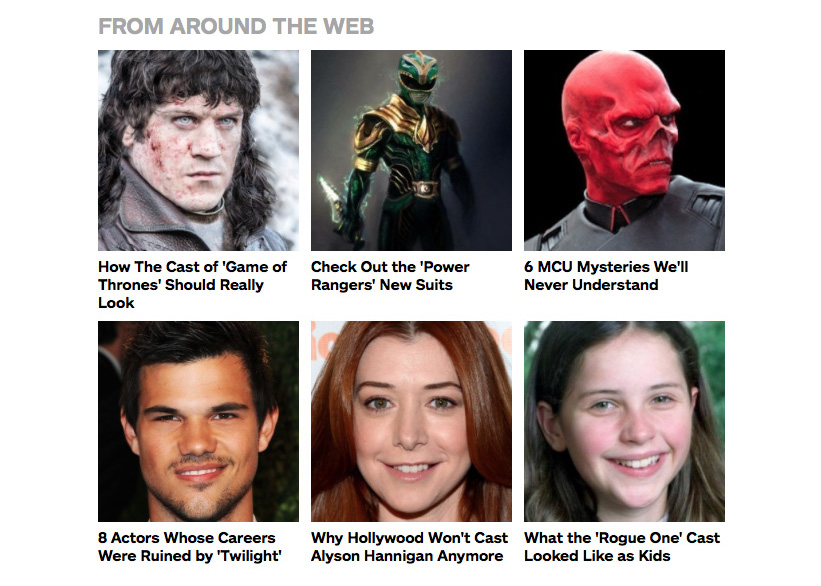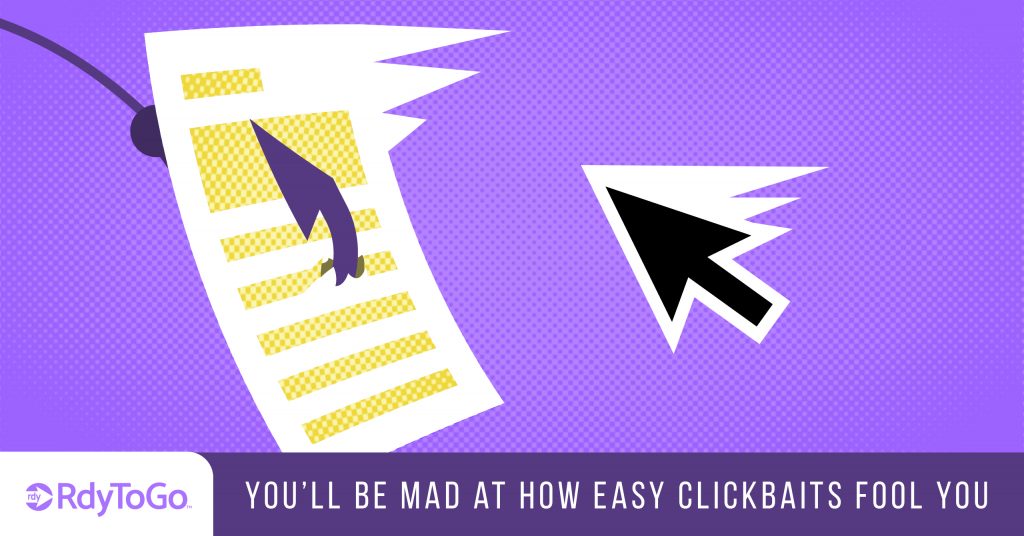
You’re not mad, right?
I’m sure you’ve seen or possibly even have read some of these ridiculous headlines around the web before. Stories claiming that they’ve got the most unbelievable claim or some bizarre new trick that some company doesn’t want you to know. There’s even the typical top ten tips for things you’ve never really cared about. Then it turns out they actually were unbelievable articles because they never really inform you of anything or backup any of their claims. Now you feel like you’ve wasted your time and caught a few extra pop-up advertisements in the process. At this point it is easy to get frustrated and feel foolish because some article seemed too good to be true. Instead of letting it get the better of you, it’s best to move on and identify the authentic article from the falsified one.
Yellow journalism or going by the modern usage ‘clickbait’ is a term used to describe exaggerated truths in order to make a profit off of one’s own curiosity. Starting over 100 years ago, yellow journalism was a rampant, unshackled mess of vague attention grabbers willing write whatever for as little as a dime. In today’s online world that hasn’t changed much but the profits are easier to nab with online ad revenue. For some online writers, their job is to appeal to the widest possible audience with little to regard of truth or consequence so that maybe a handful will click through their article. Every click is a profit for them, other people’s curiosity is nothing more than a pretty penny in their paycheck.

Example: Clickbait Articles on Hollywood
At least something is being done
Lately companies such as Facebook and Google have been tracking down on clickbait articles. Earlier this August, Facebook made it public that they would make an effort to remove a widespread issue of fake news articles from their newsfeed. [1] Since August, Facebook has seen a massive influx of fake news articles and clickbait advertisements. This is potentially linked to Facebook’s transitional period of attempting to fight fake news. In that same month, Facebook had actually fired its online editors, possibly allowing clickbait articles to spread rapidly. [2] Despite this unfavorable hiccup, Facebook still has plans to counteract the widespread problem by giving it over to their users. Facebook decided that instead of needing human editors to sort through each article, they’d like for the people to decide for themselves if the article is legitimate. [3] While great in theory, this may fall flat depending on how many are willing to participate and how authentic their help is. If Facebook doesn’t want to put the efforts into reading articles to see if they pass, how much effort will the users put into it?
Now, you might still not be convinced that fake news or clickbait titles are not all that important to you. You click any news link once, figure it’s not all that important and move on. For other people, they might believe just about anything they see. On a mass scale this can have some real world impact on people’s lives. The New York Times wrote an article that Facebook’s clickbait articles may have had a major influence on the presidential election by skewing voter opinions with falsified information. [4] If there were ever a worse time for widespread inaccurate news to pop-up, the presidential election would have been that time. Although Facebook claims that this has had no impact, this is just one of the many problems surrounding the issue of clickbait articles.

Another Example: Seriously, who writes this stuff?
No weird tricks here
With the internet continuing to grow and apps becoming a viable source for almost anything, it’s an ever lingering issue for news reporting websites to reach out to new viewers. News gathering sources like Google Newsstand or Facebook feeds have allowed articles to be streamlined to various sources in order to reach out to more readers. Google’s AMP (Accelerated Mobile Pages), Facebook’s Instant Articles and Apple news also makes it easier for clickbait articles to blend in using this modern, streamline access. The Verge wrote an article pointing out how streamlining articles into one format allows clickbait articles to sneak in much easier than before. [5] All the website needs is a headline, a picture and some text, making it look authentic enough through these open sources. The websites themselves don’t even have to have substance or look authentic in its design. So what’s stopping anyone from getting in on the outrageous headline bandwagon when they can’t be distinguished from the real deal?
In actuality, not much is stopping you or anyone else from doing the same just because it works. Clickbait headlines play on people’s emotions by offering something exciting, new and worthwhile if you just click their amazing link. Wired.com offers some more insight on the problem by explaining how titles alone manufacture a response and feed on people’s curiosity. [6] It’s a process that’s repeated time and time again, a modern idealization of yellow journalism. You may not be paying for the results, but some other company is. For some, modern journalism is becoming less about making hourly wages with decent headlines and instead making a sales quota by whatever means. Even BBC explored the changing face of journalism and how journalists are walking a thin line by balancing people’s interests while attempting to stay authentic in their report. [7]

One more example: “Man catches tiger by his tail and then bites it”
Trust your sources
Not everyone may know or even understand the idea of clickbait articles, but it’s still important for major corporations to keep them under control. There are people who are too trustworthy of the sources and wouldn’t think twice about their legitimacy. Just like what Apple, Facebook and Google are trying to do, you too should do your part and help out by letting people know that not everything they read online is legitimate. Outside the obvious material, it can become a case to case issue for what readers can say is and isn’t alright for journalists to assume or get away with for the sake of news. Just voice your opinion and things can be bound to change.
